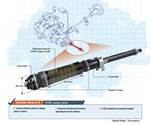CompoTech spotlights sustainable advancements in BOVENAC project
CompoTech highlights its efforts in the BOVENAC project, specifically for advancements in the design and functionality of composite joint shafts for 4WD vehicles.
Source | CompoTech
(Sušice, Czech Republic) provides updates on its involvement in the Božek Vehicle Engineering National Center of Competence (BOVENAC) project, co-financed with the support of the Technology Agency of the Czech Republic, which focuses on enhancing drive shaft technology and exploring the use of eco-friendly fibers.
The BOVENAC project is driving advancements in the design and functionality of composite joint shafts, particularly for four-wheel drive (4WD) vehicles. Its goals include:
- Enhanced performance: The composite joint shaft is engineered to meet or exceed the performance of traditional longitudinal joint shafts used in 4WD vehicles.
- Weight reduction: By incorporating composite materials, the project aims to reduce the overall weight of the drive shaft, contributing to better fuel efficiency and vehicle dynamics.
- Vibration mitigation: Special attention is given to minimizing longitudinal and torsional vibrations, which can improve ride comfort and reduce wear on vehicle components.
- Integration and innovation: Composite and steel parts are either seamlessly integrated or connected using unconventional joints, potentially reducing the number or mass of other parts in the original design.
A significant aspect of the BOVENAC project is the exploration of eco-friendly fibers to replace traditional glass and carbon fibers in composite hollow shafts used in railway vehicle chassis. Key objectives include:
- Sustainability: Identifying and optimizing the use of ecological fibers to lower the environmental impact of composite materials.
- Production technology: Developing advanced production technologies and processing techniques to effectively use sustainable fibers.
- Environmental impact: The goal is to create composite materials with a reduced ecological footprint, contributing to more sustainable transportation solutions.
Related Content
-
Carbon fiber, bionic design achieve peak performance in race-ready production vehicle
Porsche worked with Action Composites to design and manufacture an innovative carbon fiber safety cage option to lightweight one of its series race vehicles, built in a one-shot compression molding process.
-
Bladder-assisted compression molding derivative produces complex, autoclave-quality automotive parts
HP Composites’ AirPower technology enables high-rate CFRP roof production with 50% energy savings for the Maserati MC20.
-
Development of a composite liquid hydrogen tank for commercial aircraft
Netherlands consortium advances cryogenic composites testing, tank designs and manufacturing including AFP, hybrid winding, welding of tank components and integrated SHM and H2 sensors for demonstrators in 2025.



